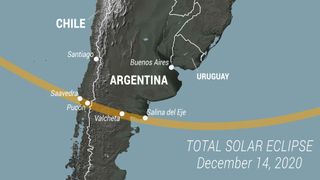Total solar eclipse 2020: Here's how to watch it online
You won't want to miss it!
Update for Dec. 14: The only total solar eclipse of 2020 wowed skywatchers in South America despite overcast skies. Read our full story and see the photos here!
This year's only total solar eclipse will cross South America on today (Dec. 14), and you can watch the spectacle unfold online thanks to a host of webcasts — no special safety glasses needed.
The broadcasts are particularly fortunate, given that the ongoing COVID-19 pandemic means eclipse-chasing is not safe this year. The eclipse will begin at 8:33 a.m. EST (1333 GMT) and conclude at 1:53 p.m. EST (1853 GMT), with totality lasting at most 2 minutes and 10 seconds. The narrow path of totality will cross from Saavedra, Chile, to Salina del Eje, Argentina; otherwise the total eclipse will cross over the Atlantic and Pacific oceans.
NASA will be broadcasting the eclipse, with camera views from Chile beginning at 9:40 a.m. EST (1440 GMT). At 10:30 a.m. EST (1530 GMT), NASA will begin a narrated program for the event in Spanish. Both will be available to watch here at Space.com courtesy of NASA or directly through the agency's website.
Related: Solar eclipse guide 2020: When, where & how to see them

The Slooh online observatory will also livestream the solar eclipse, with a star party beginning at 9:30 a.m. EST (1430 GMT) and broadcast on the group's Facebook page. Coverage will end at 12:45 p.m. EST (1745 GMT).
Thanks to a partnership with the Institute of Astrophysics of Pontificia Universidad Catolica, Slooh will be sharing views from Volcán Villarrica, one of Chile's most active volcanoes. But this time, the activity will be coming from above, with narration by a host of astronomers and eclipse chasers.
Get the Space.com Newsletter
Breaking space news, the latest updates on rocket launches, skywatching events and more!
Time and Date will also be broadcasting eclipse views throughout the event on their website beginning at 9:30 a.m. EST (1430 GMT).
Astrophysicist Gianluca Masi of the Virtual Telescope Project in Ceccano, Italy is also planning a livestream on its website here, and via YouTube. It will begin at 9:30 a.m. EST (1430 GMT) and feature live views provided by partners the Asociación Argentina Astronomía and Alma Observatory / IAPUC, Chile.
Here are some schedules for today's solar eclipse.
| Location | Partial begins | Totality begins | Duration | Partial ends |
|---|---|---|---|---|
| Saavedra | 11:38 a.m. | 1:00 p.m. | 2m 4s | 2:28 p.m. |
| Pucon | 11:41 a.m. | 1:03 p.m. | 2m 9s | 2:31 p.m. |
| Valcheta | 11:52 a.m. | 1:16 p.m. | 2m 11s | 2:43 p.m. |
| Salina del Eje | 11:59 a.m. | 1:25 p.m. | 6s | 2:50 p.m. |
| Location | Partial begins | Maximum | Partial ends | Magnitude |
|---|---|---|---|---|
| Santiago | 11:36 a.m. | 1:01 p.m. | 2:31 p.m. | 0.83 |
| Buenos Aires | 12:03 p.m. | 1:32 p.m. | 2:59 p.m. | 0.79 |
| Montevideo | 12:09 p.m. | 1:37 p.m. | 3:03 p.m. | 0.79 |
| São Paulo | 12:45 p.m. | 2:04 p.m. | 3:16 p.m. | 0.43 |
| Lima, Peru | 9:16 a.m. | 10:16 a.m. | 11:23 a.m. | 0.28 |
| Walvis Bay, Namibia | 6:58 p.m. | 7:40 p.m. | after sunset | 0.76 |
The next total solar eclipse will occur on Dec. 4, 2021 but will only be visible to a swath of Antarctica.
Visit Space.com on Dec. 14 for complete coverage of the only total solar eclipse of 2020.
Editor's note: If you capture a photo of the 2020 total solar eclipse and would like to share it with Space.com for story or slideshow, send images and comments in to spacephotos@space.com
Email Meghan Bartels at mbartels@space.com or follow her on Twitter @meghanbartels. Follow us on Twitter @Spacedotcom and on Facebook.
Join our Space Forums to keep talking space on the latest missions, night sky and more! And if you have a news tip, correction or comment, let us know at: community@space.com.

Meghan is a senior writer at Space.com and has more than five years' experience as a science journalist based in New York City. She joined Space.com in July 2018, with previous writing published in outlets including Newsweek and Audubon. Meghan earned an MA in science journalism from New York University and a BA in classics from Georgetown University, and in her free time she enjoys reading and visiting museums. Follow her on Twitter at @meghanbartels.
